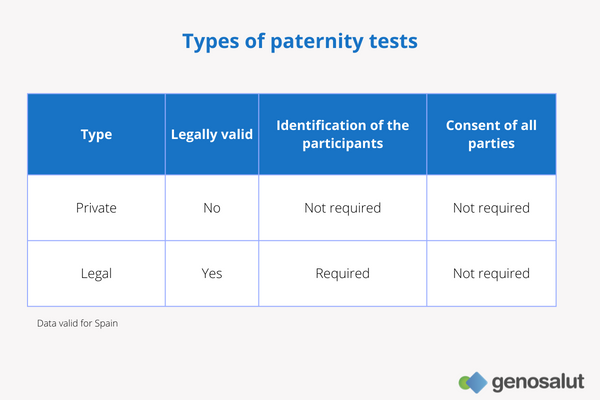Paternity tests
Which paternity tests do we offer?
Private paternity test
Legal paternity test
Prenatal paternity test
We are currently working on updating the website and we have more genetic tests available. If you do not find what you are looking for, please contact us through our contact form or call us on +34 616 59 01 65 from Monday to Friday from 9.00 am to 1.00 pm.
What is a paternity test and how does it work?
A paternity test is an examination of genetic material (DNA analysis) that makes it possible to establish or exclude the suspicion of a relationship between a man and a child.
A paternity test requires a biological sample from the child and a sample from the presumed father, while a sample from the mother is not necessary but advisable as it increases the reliability of the result.
The sample for the paternity test is usually a swab of the cheek mucosa taken with the help of cotton swabs. A small amount of genetic material (DNA) is isolated from this sample. The characteristics of the child’s DNA are compared with those of the father and the mother.
Types of paternity tests we offer at Genosalut
At Genosalut we offer different paternity tests in terms of their application: private paternity tests and legal paternity tests. We also offer prenatal paternity tests in case you want to know the information before the child is born.
Private paternity test
Determination of the biological connection between two persons for the purpose of private use. Participants do not have to identify themselves and their anonymity is guaranteed.
Legal paternity test
This paternity test is carried out if it is to be used in legal proceedings. For this reason, the requirements are higher: the persons tested must be identified and the control of the samples must be guaranteed until the analysis and transmission of the results.
Prenatal paternity test
It is used to establish the biological relationship between an alleged father and his unborn child.
Depending on how the samples are taken, they can be private or legal, invasive or non-invasive.
Our value proposal
Experience
At Genosalut, we have more than 10 years of experience in counselling people with conditions where a genetic cause has been identified or is thought to be possible.
Proximity
We are a close laboratory, we respond personally and we take the time to explain the report in detail to doctors and patients.
Professional interpretation of results
Because of our knowledge and experience, we are able to accurately interpret genetic results and offer professional advice.
Reference in the field
We are the point of contact for patients, doctors and clinics in all areas of human genetic diagnostics and prevention.
What is the difference between a private paternity test and a legal paternity test?
In terms of their usefulness for legal purposes, paternity tests are classified as private and legal. They have some common features, such as their reliability and the possibility of performing them (for Spanish citizens in Spain) without the consent of all participants. However, there are also some differences, such as their legal validity and the need to identify the participants.
Private paternity test
Determination of the biological relationship between two persons for private use. Participants are not asked to identify themselves (to ensure their anonymity) and the information obtained cannot be used for legal proceedings.
Legal paternity test
This paternity test is carried out if it is to be used in legal proceedings. For this reason, the requirements are higher: the persons tested must be identified and the control of the samples must be guaranteed until the analysis and transmission of the results.

FAQs
What is examined in a paternity test?
For a paternity test, only certain areas of the repetitive DNA in the non-coding regions are important.
Scientists call these repeats short tandem repeats (STRs). STRs consist of two to seven DNA bases that can be repeated several times. For example, the sequence “GATC” can occur eight times in one person but fifteen times in another.
They are as individual as a fingerprint and make it possible to identify people almost uniquely (with the exception of identical twins).
Are paternity tests associated with risks?
Taking a paternity test (with the exception of invasive prenatal paternity tests) is risk-free.
Can a paternity test be wrong?
The result of a paternity test is very reliable. Non-existent paternity can be ruled out almost 100% of the time; technical errors are rare. If a paternity test is positive, i.e. proves paternity, the test is correct in more than 99.9% of cases.
Is it possible to perform a paternity test during pregnancy?
Yes, prenatal paternity tests make it possible to establish the biological relationship between an alleged father and his unborn child. Depending on how the samples are taken, they can be informative or legal, invasive or non-invasive. (Applies to Spain).
Request an appointment with us
Opening hours
Monday to Friday from 9.00 am to 1.00 pm
+34 616 59 01 65
info@genosalut.com
Camí dels Reis, 308 (Clínica Palma Planas)
Contact form
Reasons for trusting Genosalut
First genetic diagnosis laboratory in the Balearic Islands
Professionals with experience in medical genetics
Detailed report of the results
Personalised attention for each patient
Wide range of genetic tests
Cutting-edge technology
